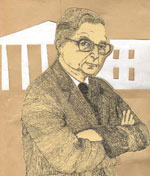 We could do with a little less of Seymore. Famed investigative reporter Seymore Hersh has been a long time critic of US military policy and procedures, as far back as the infamous Me Lai Massacre. He broke that story, and in so doing, was also credited for breaking the will of the American public to support the Johnson Administration’s prosecution of the Viet Nam War.
We could do with a little less of Seymore. Famed investigative reporter Seymore Hersh has been a long time critic of US military policy and procedures, as far back as the infamous Me Lai Massacre. He broke that story, and in so doing, was also credited for breaking the will of the American public to support the Johnson Administration’s prosecution of the Viet Nam War.The rest is history.
One wonders if Hersh would like to see a little history repeated. The stakes this time around are higher.
I think criticism can be a good thing, if it results in positive change. Criticism for the sake of being critical, or for the purposes of promoting one’s own view without providing a realistic alternative, is not a good thing. And in some cases, it’s very dangerous. Criticism of some issues during wartime goes over the line into irresponsibility, and I think Hersh is crossing that line.
 In Canada last week, Hersh told the crowd at the Media@McGill conference that the good news about the reign of King George II of America is that “tomorrow morning there’ll be one less day." Hardly a sticks and stones kind of comment, but it definitely puts Hersh in the sandbox with The Dixie Chicks and other loud-mouthed Americans with the poor taste to criticize their homeland while away from home.
In Canada last week, Hersh told the crowd at the Media@McGill conference that the good news about the reign of King George II of America is that “tomorrow morning there’ll be one less day." Hardly a sticks and stones kind of comment, but it definitely puts Hersh in the sandbox with The Dixie Chicks and other loud-mouthed Americans with the poor taste to criticize their homeland while away from home.Unlike the Chicks, Hersh is a serious, credible journalist, having broken stories about the secret U.S. bombing of Cambodia, covert C.I.A. attempts to overthrow Chilean president Salvador Allende, and, more recently, the first details about American soldiers abusing prisoners at Abu Ghraib prison in Iraq.
In some ways, the Abu Ghraib story needed to be told. But not the way Hersh is relating it—not with his endgame, which is only designed to encourage the enemy and defeat the spirit of our troops.
Hersh recalled during Vietnam, "our soldiers came back and they were reviled as baby killers, in shame and humiliation.” While that's not happening now, but Hersh told the Canadians there "has never been an [American] army as violent and murderous as our army has been in Iraq.”
That’s where Hersh doesn’t get it.
You see, War is not supposed to be a gentlmen’s game. That went out in the French and Indian War, when the traditional ranks and files of soldiers were decimated by a new kind of enemy, using Indian tactics of firing from concealed positions and wearing garments that blended with their surroundings.
The American military needs to be only as violent and lethal as the enemy it is fighting. Anything less will result in failure. Of all the critics and pundits on the War, Hersh should get that concept the best.
2 comments:
We supposedly went into Iraq because of one man - Saddam Hussain. Our "shock and awe" bombing campaign killed over 100,00 civilians. Later, our troops went house to house, pulling out the male family members, either killing them or sending them to jail, usually without any reason. We destroyed the infrastructure of the country, displaced millions of citizens, and enabled a civil war between Sunni and Shia factions in the country.
There were NO "weapons of mass destruction" in Iraq, except the ones we brought with us. The people of Iraq did not ask us to rid them of Saddam, we attacked a sovereign country without provocation.
So what is it that Seymore has gotten wrong ? We are the aggressors who killed or destroyed the lives of millions of people for no good reason other than for oil or for a neocon wet dream of making the Middle East "safe" for Israel ...
Wow--glad you jumped right on this post...from November 2006. Arguably, perspectives and perceptions can change in the one-year and 11-months since this piece was written.
However, one thing remains clear--had we NOT gone into Iraq, we'd most assuredly be fighting a bigger war on different fronts, thanks to a formidable enemy operating from that base in addition to Afghanistan, and possibly Iran.
It's all connected.
The intel upon which the decision to go into Iraq was made, we now know, was flawed. We didn't know that then; the decision was based on the facts as they were presented. There are a lot of pontificating, pompous politicians pounding their chests against the war now, who voted at the time to go in.
You can arm-chair quarterback this until Kingdom come, but you cannot re-write history.
Let's not forget who the enemy is here, Mr. Anonymous Tardy Poster (I can almost hear the Bud Light Jingle Singer...)
There were more even-handed ways in which Hersh could have reported this story. I stand by my opinion that he had an axe to grind when he put pen to paper...or I suppose, keyboard to Internet.
Thanks for the comment. Hope to hear from you again...in, say, two years.
Post a Comment